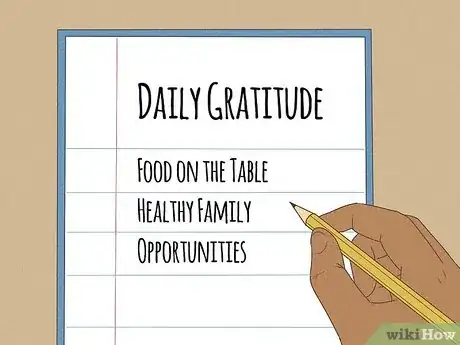This article was co-authored by Julia Lyubchenko, MS, MA. Julia Lyubchenko is an Adult Counselor and a Hypnotherapist based in Los Angeles, California. Running a practice called Therapy Under Hypnosis, Julia has over eight years of counseling and therapy experience, specializing in resolving emotional and behavioral problems. She has a Certificate in Clinical Hypnosis from the Bosurgi Method School and is certified in Psychodynamic Psychotherapy and Hypnotherapy. She earned an MA in Counseling Psychology and Marriage and Family Therapy from Alliant International University and an MSc in Developmental and Child Psychology from Moscow State University.
There are 16 references cited in this article, which can be found at the bottom of the page.
This article has been viewed 144,791 times.
Feeling emotional is normal. It's human nature to experience hurt and pain. If you're a sensitive person who gets hurt easily or has trouble moving on from emotional rough spots, you're not alone. Getting back on your feet and being strong in the face of adversity is an essential life skill. Use these tips to develop emotional resilience that will help you deal with the tougher times.
Steps
Understanding Resilience and Your Feelings
-
1Understand resilience. Resilience is the ability to bounce back after difficulties, frustration, and significant stress. Resilience does not mean that you toughen up so much that you do not experience negative events, just that you can move on from them.[1]
- Adaptation to new circumstances is a key feature of resilience.
- Essential factors in developing resilience are having a supportive emotional network, feeling confident in yourself and your abilities, and using problem solving skills.[2]
-
2Acknowledge your feelings.[3] Understanding the specific source of your pain will help you better prepare to face the issue head on.[4]
- Tracking your feelings in a journal is a good way of seeing how often and, more importantly, why you feel frustrated or upset. Once you see a pattern, you can decide where to focus your energy.
Advertisement -
3Accept that emotions are a normal part of life. Instead of trying to negate or remove your feelings, realize that accepting your emotional distress is a way in-and-of-itself to cope with life’s ups and downs.[5]
- You don’t have to be superhuman. Emotional avoidance can actually work against you by building up stress below the surface. Suppressing your pain can backfire and diminish your sense of well-being.
- Allow yourself appropriate time to sit with your emotions and acknowledge and feel them before moving on. Sometimes, just sitting to have a good cry or breathing through your anger is the necessary first step.[6]
Reshaping Your Mental Habits
-
1Work on decreasing your stress level. No one can live without stress but the key is to live comfortably with stress without letting it overwhelm you.
- If you don’t sweat the small stuff, practice mindfulness, and stay healthy, you will be stronger to deal with hard days.
-
2Use feedback as an opportunity to learn. Look at what you can improve. People who respond positively to constructive feedback tend to learn, grow, and be more successful.[7]
- Practice asking for constructive feedback from friends or trusted coworkers. Provide them with an aspect of your life that you feel safe using as a topic, and ask them to constructively critique you, so that you can become accustomed to receiving and using feedback to your advantage.
- For example, have a colleague look over a spreadsheet you create at work and ask for input on how to improve it to make your work more efficient. Or, cook your favorite dish for a trusted friend and ask for his thoughts on your presentation and plating.
-
3Take control of your life. Be sure to not make excuses for your life situation. Instead, adapt, be confident and stop making excuses.
- Develop your problem solving abilities. Write out what is bothering you, brainstorm how many different ways you can approach the problem, assess the pros and cons of each approach, implement an approach, and evaluate the outcome.
-
4Compartmentalize. Take away useful lessons from negative events and situations without becoming fixated on the problems. Disregard any unhelpful additional information.[8]
- For example, if you arrived late for work one morning and your boss made a sarcastic comment, focus on the concrete aspects you can work on, such as punctuality, and ignore any hot-headed remarks.
-
5Practice mindfulness. Being mindful is being aware of the present moment and it distances you from the immediacy of your emotions. To practice mindfulness is to more fully appreciate the present and reduce feelings of pain and past hurts.
- An excellent way to practice becoming mindful is to sit quietly with a raisin in the palm of your hand. Feel the raisin’s weight. Roll it between your fingers and feel the texture and ridges. Smell the raisin. By focusing on the raisin, you are becoming truly mindful in the present. Apply this practice to everything you approach in life. If you don’t have a raisin, focus on your surroundings, your breath, and you physical sensations.
-
6Remember that the world is not out to get you. Shift your perspective to being more open to possibilities and reduce automatic negative thoughts.
- If you can shift your perspective and view things at face value, you may realize that someone who missed a coffee date may not be trying to hurt your feelings but maybe had an unexpected emergency arise and forgot to phone you.
-
7Practice gratitude. Studies have shown that the key factor to happiness is gratitude, or being thankful. Gratitude increases resilience and improves your immunity so you’ll feel much stronger to deal with life’s curveballs.
- Keep a gratitude journal. Every night before bed, write down three things for which you are thankful. Review this list whenever life feels hard.[9]
-
8Practice forgiveness, of yourself and others. Examine whether that grudge or sadness is serving a positive function in your present life. If it is not, let go of the past and live more purposefully in the present.[10]
- List the reasons you might be angry at yourself, then read the list as if you are observer and let the feelings come and go. Be kind to yourself.[11]
- Develop empathy for others. If you are feeling hurt by something someone else says or does, try to put yourself in that person's shoes. It can be difficult to empathize with someone who's just hurt your feelings, but considering his point of view and what he might be going through can be a calming, reasonable exercise.[12]
-
9Teach your children resilience. Even young children can learn how to deal with the tough times in life. Give them problem-solving opportunities. Teach them that mistakes are normal and are opportunities to learn.
- Teach your children empathy. Increased empathy toward others decreases negative automatic thoughts and increases resilience.[13]
Reshaping Your Physical Habits
-
1Laugh. Laughing alleviates a stressful situation, releases endorphins to invigorate your mind and body, and improves your immune system.[14]
- Laughter really is the best medicine.[15] Try some laughter therapy yourself. Watch “Patch Adams” or a funny movie that you love, or go to a comedy club with friends.[16]
- Look into laughter yoga. People all over the world are being trained to practice laughter yoga to heal the mind, body, and spirit.
-
2Write it down. Studies have shown that putting feelings into words helps you deal with your emotions, halting these negative feelings. Putting your thoughts on paper can provide an emotional release and makes our emotional pain less intense.[17]
- Keep a private journal, write letters that you never send, or blog about the tough times.
-
3Keep connected. Stay in touch with family and friends who will be there for you during the tough times. Because it often takes bravery to admit you have a problem, part of being resilient is being able to ask for and accept help.[18]
- Commit to social activities as a way of keeping connected. Find a meet-up or schedule a regular crochet chat with your friends, for example.
-
4Maintain a diet of mood-boosting foods. Science has shown that certain foods can affect your brain and your mood. From chocolate to the Omega-3 fatty acids found in fish, your diet affects your health, so be sure to eat right in preparation of facing life’s challenges.
- One of the most widely recommended dietary plans to follow is the DASH diet. The DASH diet, named for Dietary Approaches to Stopping Hypertension, aims to control salt and keep blood pressure at a healthy level, especially important because hypertension (or high blood pressure) has been called ‘the silent killer.’ By keeping your blood pressure under control naturally, you will be in a healthy state to deal with life’s struggles.
-
5Exercise regularly to boost your mood, increase your energy, and keep healthy. Staying active can reduce anxiety, stress, and irritable feelings.[19]
- Doctors recommend getting at least 30 minutes of heart-pumping exercise a day, but you can even break that amount up into 10 minutes segments. Have a quick jog, climb some stairs, play a quick game of tennis, or go for a bike ride with the kids. Your heart and your mood will thank you.[20]
References
- ↑ http://www.apa.org/helpcenter/road-resilience.aspx
- ↑ http://www.apa.org/helpcenter/road-resilience.aspx
- ↑ Julia Lyubchenko, MS, MA. Adult Counselor & Certified Hypnotherapist. Expert Interview. 29 April 2020.
- ↑ http://www.scientificamerican.com/article/negative-emotions-key-well-being/
- ↑ Julia Lyubchenko, MS, MA. Adult Counselor & Certified Hypnotherapist. Expert Interview. 29 April 2020.
- ↑ Julia Lyubchenko, MS, MA. Adult Counselor & Certified Hypnotherapist. Expert Interview. 29 April 2020.
- ↑ http://www.fastcompany.com/3002460/thick-skin-thinking-how-use-negative-feedback-your-advantage-work
- ↑ https://www.psychologytoday.com/blog/skinny-revisited/201307/compartmentalizing-2
- ↑ http://greatergood.berkeley.edu/article/item/tips_for_keeping_a_gratitude_journal
- ↑ http://www.mayoclinic.org/healthy-lifestyle/adult-health/in-depth/forgiveness/art-20047692
- ↑ http://www.huffingtonpost.com/dawn-gluskin/forgiveness-tips_b_3306557.html
- ↑ http://greatergood.berkeley.edu/article/item/six_habits_of_highly_empathic_people1
- ↑ http://www.zerotothree.org/child-development/social-emotional-development/take-a-walk-in-my-shoes.html
- ↑ http://www.mayoclinic.org/healthy-lifestyle/stress-management/in-depth/stress-relief/art-20044456
- ↑ http://www.laughteronlineuniversity.com/laughter-less-stress-better-health-energy/
- ↑ http://www.theguardian.com/lifeandstyle/2008/jul/06/healthandwellbeing4
- ↑ http://newsroom.ucla.edu/stories/putting-feelings-into-words-155536
- ↑ http://www.apa.org/helpcenter/road-resilience.aspx
- ↑ http://www.realsimple.com/health/fitness-exercise/5-mood-boosting-workouts
- ↑ http://well.blogs.nytimes.com/2015/04/15/the-right-dose-of-exercise-for-a-longer-life/
About This Article
If you want to toughen up emotionally, try your best to focus on what you can change about negative situations and let go of the things you can’t change. For example, if you arrive late for work and your boss makes a sarcastic comment about it, focus on figuring out how to be on time next time and ignore the unhelpful comment. It’s also helpful to practice gratitude, which can make you feel stronger and more equipped to deal with bad days. For example, even if you were late to work, there are many good things to be thankful for, such as your good health, a loving family, and fulfilling hobbies. Another good way to be tough emotionally is to reduce stress in your life by practicing mindfulness. To do this, sit in a quiet room and focus on your surroundings and physical sensations, which will help you let go of negative thoughts and focus on the present. To learn how to eat foods that will boost your mood, read more from our Counselor co-author.





















-Step-11.webp)



















-Step-11.webp)


































